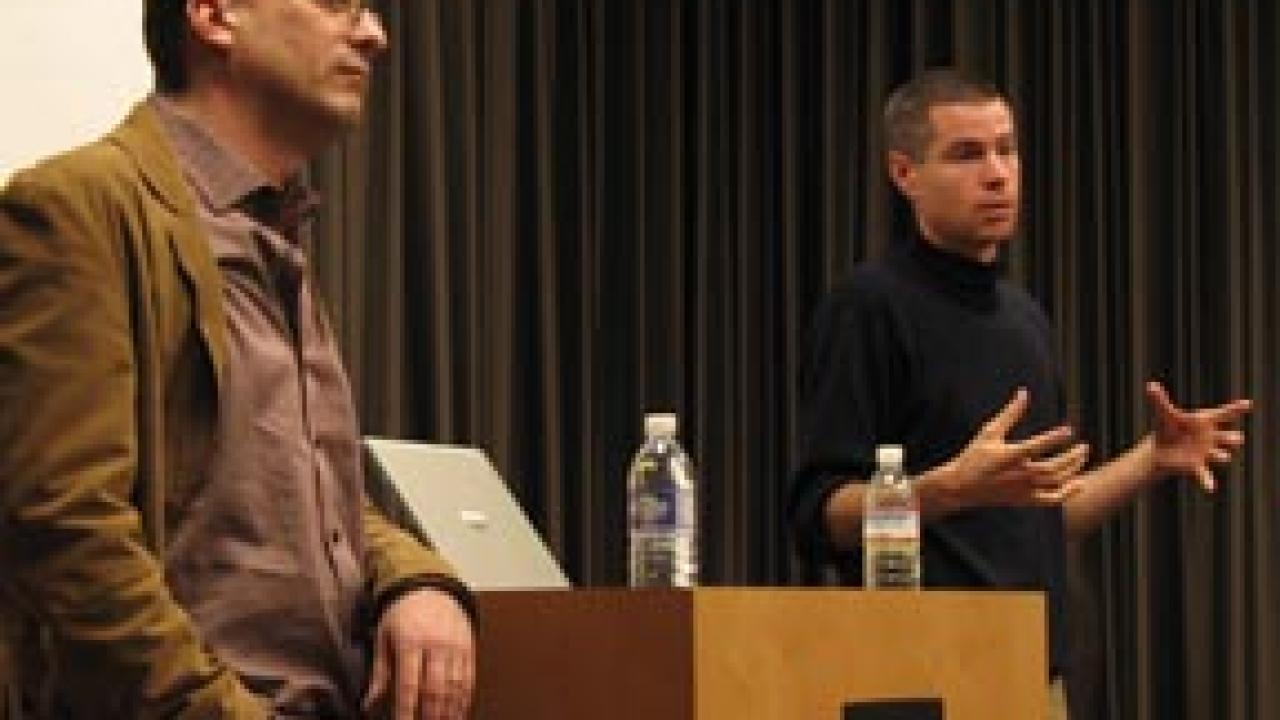The ecological crises the world faces today are far more complex and global than the issues the environmental movement addressed 40 years ago. This requires a new way of 'thinking green,' argue veteran environmental advocates Michael Shellenberger and Ted Nordhaus, who spoke on campus Feb. 27 in a discussion sponsored by the John Muir Institute of the Environment. Their eyebrow-raising talk drew a standing-room crowd to Room 3001 in the Plant and Environmental Sciences Building.
Deb Niemeier, the director of the institute, introduced the authors as "Frank and Jesse James," the infamous 19th century Western outlaws. Indeed, Shellenberger and Nordhaus' recently released book, Break Through: From the Death of Environmentalism to the Politics of Possibilty, challenges environmental orthodoxy based on conclusions drawn from three years of research and interviews. For example, it criticizes a self-congratulatory environmental movement for holding on to old pollution and conservation paradigms that have failed. Overcoming global warming, they state, demands not pollution control but rather a new kind of economic development approach — one that is politically effective.
As Shellenberger explained during the campus talk, "Don't confuse green rhetoric with policy reality — you have to look at the legislation being pushed in Congress."
He added that enforcing stricter controls on factories and proliferating low-emission vehicles, will only make a dent in carbon dioxide levels. Though measures to reduce carbon emissions are vital to repairing the damage done to the atmosphere by burning fossil fuels, they write, many environmentalists have grossly underestimated the amount of effort needed to make a significant change, they said.
To slow down global warming by a significant measure, the writers estimate it would take $30 billion to buy down the price of clean energy. And so, they call for a massive lobbying effort that would generate government action in making fossil fuels less attractive to industry. The writers cite the railroads, the Internet and the electrical system as models for establishing clean energy as the global norm. Inducing a worldwide shift toward the exclusive use of clean energy requires that "we move beyond thinking that a silver bullet will save the day," said Shellenberger.
Their argument raised questions that probed the scope or their research. When asked if the two writers had neglected to factor in the possible effects that private funding might have on the global warming effort, they replied that public money runs deeper than private during a crisis. They sited the Department of Defense's budget, totaling somewhere around $440 billion, as evidence.
"National security has motivated most of the government's investments," said Nordhaus.
Veteran environmental advocates, Shellenberger and Nordhaus stirred up a fuss when they published their 2004 essay, "The Death of Environmentalism." In it they argued that the great successes of the modern environmental movement in the '60s and '70s had laid the seeds of their failure in the early years of the 21st century. This came as sacrilege to many in the movement — and to others, it was a historical opportunity for truth-telling.
Shellenberger and Nordhaus later said they wrote the essay thinking that it would generate discussion among grantmakers and environmental insiders — and not be read by green advocates all over the world.
And yet the two writers received little antagonism from the UC Davis audience packed with environmentalists.
In many ways, fear works both end of the debate, they said. "Does fear motivate the kind of change we want to see?" asked Nordhaus.
Shellenberger answered that scaring Americans with doomsday prophecies will more likely cause them to buy an SUV for the rough weather likely to come than to move them into thinking green.
Tom Johnson is a Dateline writing intern.
Media Resources
Clifton B. Parker, Dateline, (530) 752-1932, cparker@ucdavis.edu
